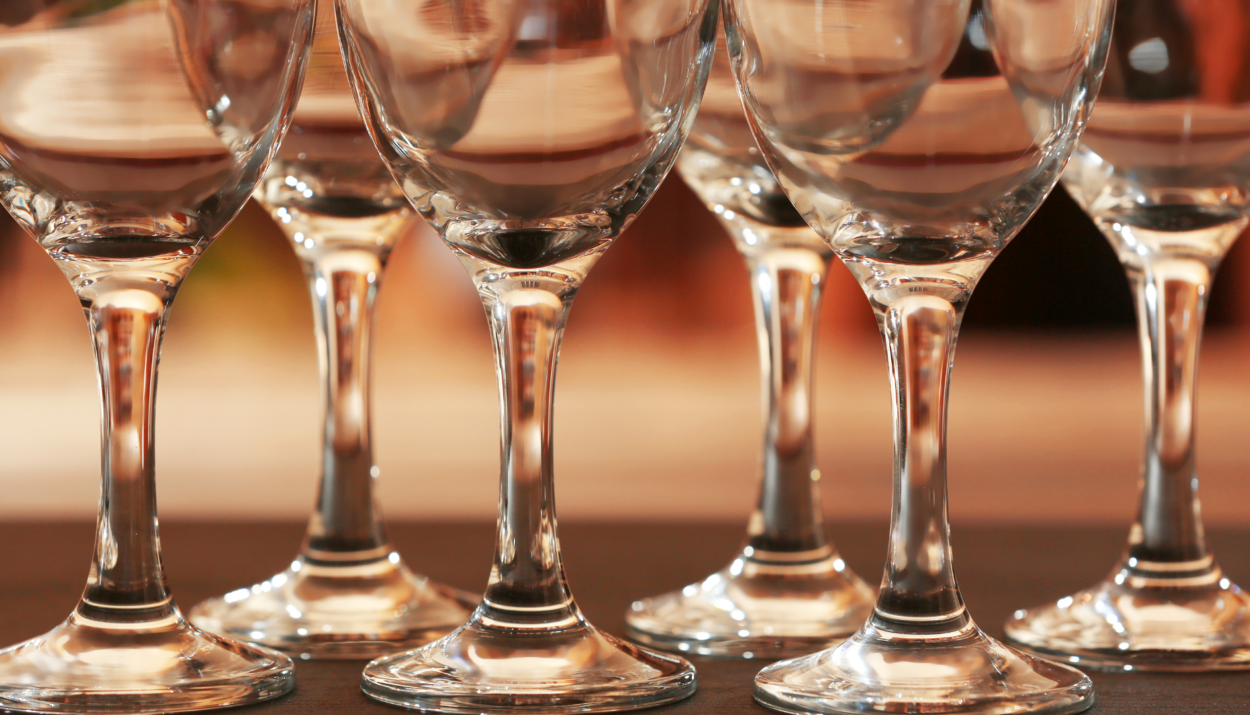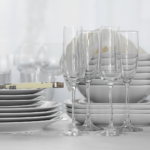Clean glassware is vital for aesthetics and taste. Dirty glasses affect the quality of drinks, while smudges look unappealing. You can keep your glassware in good condition by maintaining it well. Clean and maintain them properly to ensure clarity and longevity. In this blog, we will explore different methods to clean glassware and how to care for them effectively. We will discuss handwashing and dishwashers as well as ways to maintain different types of glassware. Let’s discover the best practices for glassware maintenance.
Cleaning and Maintaining Glassware
To ensure that your glassware remains clean and sparkling, it is important to establish a regular cleaning routine. Glassware maintenance can be simple and straightforward, involving basic materials such as warm water, mild dish soap, and a soft microfiber cloth. By incorporating these essential tools, you can prevent smudging, remove dirt and grime, and maintain the clarity of your glassware.
Impact on Taste and Aesthetics
Dirty glasses can significantly impact the taste of beverages, affecting the overall drinking experience. When it comes to cleaning glasses, different methods such as hand washing and dishwashers are commonly used. It is crucial to use the right type of detergent and water temperature to ensure effective cleaning. Additionally, proper drying techniques must be employed to avoid streaks or water spots, enhancing the aesthetic appeal of the glassware for both presentation and customer satisfaction. Utilizing a clean microfiber cloth and dishwashing liquid can contribute to maintaining the clarity and cleanliness of the glassware, ensuring an enjoyable drinking experience for users.
Lifespan of Glassware
Proper maintenance and cleaning practices play a vital role in prolonging the lifespan of glassware. To avoid damage, refrain from using harsh chemicals or abrasive cleaners that can harm the glass. Opt for hand-washing with a mild detergent as the safest method, especially for delicate glassware. For stubborn stains, soaking the glass in a warm water and vinegar or baking soda solution can be highly effective. Additionally, organized and safe storage helps prevent damage and extends the longevity of glassware. By following these practices, you can ensure that your glassware remains in excellent condition for an extended period, enhancing both its aesthetic appeal and utility.
Guide to Cleaning Glassware
Cleaning glass drinking glasses is a quick and straightforward process, requiring just a few simple steps. By following this guide, you can effectively clean your glassware and maintain its cleanliness and clarity.
Preparing
Before cleaning your glasses, gather all necessary supplies, including a clean and soft cloth, mild soap, and warm water. Rinse the glasses with warm water to remove any large debris or dirt. Apply a small amount of mild soap to the cloth and gently clean the glasses, avoiding any harsh scrubbing or pressure. Thoroughly rinse the glasses with warm water and dry them with a clean and soft cloth or let them air dry. Consider using specialized cleaning products or techniques for certain types of glasses, such as wine glasses or crystal glassware. This preparation will ensure that your glasses are ready for a thorough and safe cleaning process.
The Cleaning Process
To thoroughly clean your glasses, start by using warm, soapy water and a soft cloth to gently remove any smudges or residues. Avoid harsh chemicals that can damage the glass, instead opt for a specialized glass cleaning cloth or a microfiber cloth to prevent streaks. If your glasses are labeled as dishwasher safe, consider using a dishwasher to clean them effectively. Finally, store your cleaned glasses in a safe place to prevent scratches or breakage, ensuring they remain in pristine condition for future use.
Drying and Storing
After carefully cleaning your glassware, ensure thorough drying to prevent water spots and mineral deposits. Soft, lint-free cloths are ideal for drying, as they won’t leave any residue or scratch the surface. When storing, consider using individual cloth bags or separators to prevent chipping or scratching. Store your glassware in a cool, dry place away from direct sunlight, which can cause fading or damage. Proper drying and storage can help maintain the aesthetics and lifespan of your glassware, ensuring clarity and brilliance for every use.
Understanding Cleaners in Glassware Maintenance
When it comes to maintaining glassware, it’s crucial to understand the different types of cleaners available. Some commonly used cleaners include mild dish soap, white vinegar, and baking soda. However, using isopropyl alcohol for cleaning glasses requires special consideration. It’s important to weigh the pros and cons, taking into account factors like material, lens coating, and overall impact on longevity and cleanliness. Understanding the appropriate cleaners for glassware maintenance is essential for preserving the quality and lifespan of your glassware.
Commonly Used Cleaners
When it comes to maintaining glassware, several commonly used cleaners can effectively keep your glasses in top condition. Rubbing alcohol proves to be a powerful cleaner, ensuring smudge-free clarity while warm water with dish soap offers a gentle yet potent solution for glassware maintenance. Additionally, using a microfiber cloth guarantees a lint and smudge-free cleaning experience, while vinegar serves as an effective cleaner, removing grime and germs from glass drinkware. Lastly, utilizing lemon juice can effectively remove smudging and provide unparalleled clarity for your glasses.
Isopropyl Alcohol – Safe or Not?
Using isopropyl alcohol to clean glasses is common, but it’s important to use it in small amounts. A mild soap solution is also suitable for cleaning lenses without damaging any special coating or clarity. Ultrasonic cleaning and lens spray can provide a thorough clean, while a microfiber cloth prevents smudging and lint.
Special Care for Wine Glasses
Handling delicate wine glasses requires special attention. The fragility of the glassware makes it susceptible to damage. When cleaning, use a gentle touch to avoid breakage and maintain their elegance. It’s important to hold the glass by the stem to prevent transferring body heat and impacting the wine’s temperature. Use soft materials for cleaning to protect the glasses from scratches or other damage. Storing them separately can also prevent potential chipping or breakage. Taking these precautions will ensure the longevity of your delicate wine glasses.
Handling Delicate Wine Glasses
When handling delicate wine glasses, it’s important to hold them by the stem to prevent smudges and smudging. Carefully wash the glasses to avoid smudging and scratches, using mild soap to clean them without damaging the coating. Always maintain clarity by using a clean microfiber cloth and ensure hygienic glassware maintenance by removing grime and germs. Proper handling and cleaning will preserve the quality of your delicate wine glasses for an extended period.
Cleaning Techniques for Wine Glasses
Maintain the clarity and hygiene of your wine glasses by rinsing them under running water to eliminate residue and germs. Avoid using paper towels, as they can leave lint on the glasses. Look for hand soap or dishwashing liquid to preserve the coating and cleanliness of your glassware. This helps in optimal glassware maintenance, ensuring that your glasses remain in top condition for a long time.
Don’ts in Glassware Cleaning
When cleaning glassware, avoid harsh scrubbing to prevent scratches. Don’t use strong detergents that may leave a residue or affect the taste of beverages. Avoid air-drying glassware as it can lead to water spots. Ensure you don’t stack glasses when storing to prevent breakage or scratches. It’s important not to use abrasive materials or cleaners that may damage the glass surface.
Avoiding These Mistakes
When cleaning glasses, avoid using dish soap with added bleach, as it can harm the coating. Additionally, steer clear of using photochromic lenses cleaner on regular glasses to prevent smudging. Never clean glasses with bleach, as it can damage the lens coating. Furthermore, avoid using paper towels to clean glasses, as they may leave lint and smudges. Understanding what to avoid when cleaning glasses is essential for proper maintenance and long-term eye care.
Materials to Avoid
When cleaning glasses, it’s important to avoid certain materials to maintain their quality. Toothpaste can damage the coating, and dishwashing liquid with fabric softener leaves residues. Isopropyl alcohol strips the coating on eyeglass lenses, and vinegar can cause smudges. Understanding the materials to avoid is crucial for proper eye care and the longevity of your glasses.
Professional Cleaning Services for Glassware
When it comes to professional cleaning services for glassware, it’s essential to consider the expertise and equipment offered. Understanding the techniques and products used by these services can ensure the longevity of your glassware. Additionally, professional cleaning can help remove stubborn stains and spots that regular cleaning might miss, maintaining the aesthetic appeal of your glassware. When evaluating different services, inquire about their methods, products, and guarantees to make an informed decision for your glassware maintenance.
When to Consider Professional Cleaning
When contemplating professional cleaning, consider ultrasonic cleaning for glasses with special coating. This method is especially beneficial for heavily soiled glasses and those with hard-to-remove smudges. Professional cleaning is recommended for glasses with stubborn smudges or lint that regular cleaning fails to address. Understanding when ultrasonic cleaning is necessary is crucial for effective glasses maintenance.
Choosing the Right Service
When selecting a professional cleaning service for your glasses, prioritize experience in eyewear care. Look for gentle cleaning methods to preserve the integrity of the glasses lens and frames. Research and consider customer reviews to gauge the service’s reputation. Look for an optician who specializes in eyewear maintenance and can provide new eyewear if needed. Choosing a service that understands the significance of eye care and the nuances of different types of eyewear is essential for maintaining the quality of your glasses.
Keeping Your Glassware Clean between Uses
To keep your glassware in top condition between uses, start by gently washing them with mild soap and warm water. Be sure to dry them thoroughly with a clean, lint-free cloth to prevent water spots. Store them in a cool, dry place, making sure not to stack them to avoid scratches or breakage. Consider using protective covers for extra care. Implementing these practices will help maintain the cleanliness and longevity of your glassware, ensuring that they remain in excellent condition for a long time.
Daily Maintenance Tips
To keep your glasses in top condition, start by using warm water and dish soap for cleaning. After washing, make sure to dry them with a clean microfiber cloth to avoid lint from paper towels. To prevent smudges, store your glassware in a glasses case. Regular cleaning not only prevents smudging but also maintains the clarity of the glasses. These daily maintenance tips will help you ensure the longevity of your eyewear and keep them looking as good as new for longer.
Is Regular Maintenance Enough for Long-lasting Glassware?
Regular maintenance plays a crucial role in ensuring the longevity of glassware. By properly caring for your glasses and performing daily maintenance, you can preserve their clarity and aesthetics. Regular cleaning is essential to prevent smudging and maintain the overall quality of your glassware.
Frequently Asked Questions
What are some tips for preventing scratches and damage to glasses during the cleaning process?
To prevent scratches and damage to your glasses during cleaning, use a soft microfiber cloth instead of abrasive materials like paper towels or tissues. Consider a gentle soap or lens cleaner designed for glasses. Avoid cleaning when they are dry to minimize the risk of scratches.
Is it safe to clean glasses and glassware in a dishwasher?
Cleaning glasses and glassware in a dishwasher is generally safe. However, consider the water temperature and detergent used to avoid damage. Place the glasses on the top rack to prevent potential harm from other dishes or silverware. Alternatively, hand washing with mild soap and warm water is also a safe option.
Conclusion
Proper glassware care is crucial to maintain its lifespan and appearance. To preserve the taste and look of your glasses, use suitable cleaners and cleaning techniques. Be gentle with delicate wine glasses to avoid breakage and never expose them to extreme temperatures or abrasive materials. Professional cleaning services may be necessary in some cases. Implementing daily maintenance tips will keep your glassware clean between uses. Follow these guidelines for sparkling clean glasses every time you enjoy your drink.




